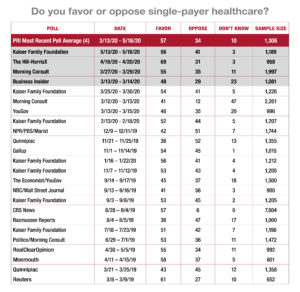Support for Medicare for All continues to rise in PRI’s Single-Payer Poll Watch. The June update shows the overall average support at 57 percent, while opposition slightly dropped to 34 percent.
 Last month’s update showed a ten-point jump in support during the height of shelter-in-place orders and lockdowns because of the coronavirus pandemic.
Last month’s update showed a ten-point jump in support during the height of shelter-in-place orders and lockdowns because of the coronavirus pandemic.
The puzzling question is that despite the recent jump in support for Medicare for All, why is Congress or state legislatures not rushing to pass it into law? Colorado recently shelved a version of a public health insurance option. Given the pending recession and financial trauma staring down state government budgets, it’s safe to say most legislatures and governors want to avoid the expensive costs of a single-payer system for now.
But looking at the national picture, a single-payer system looks as far off as ever.
Senator Elizabeth Warren recently said that “people want to see improvements in our health care system,” largely walking away for a single-payer health care system, possibly in an attempt to position herself as a better running mate for Joe Biden.
Biden continues to publicly reject Medicare for all. “I do not support Medicare for All. I will not support Medicare for All. But I do support making sure that Obamacare is around with a public option,” he said in a May 29 interview with CNBC’s “Squawk Box.”
Sally C. Pipes, PRI’s President and CEO, called out the former vice president’s health care policies during a PRI webinar on Medicare for All and the coronavirus on May 20. She has long argued that a public option is a steppingstone to Medicare for All. As proof, she zeroes in on one the most common misconceptions of Medicare for all: the ability to keep your insurance.
The Kaiser Family Foundation notes in a recent summary of their Medicare for All polling that, “many people falsely assume they would be able to keep their current health insurance under a single-payer plan, suggesting another potential area for decreased support especially since most supporters (67 percent) of such a proposal think they would be able to keep their current health insurance coverage.”
In addition to a public option, Biden proposes allowing optional buy-ins to Medicare at 60-years-old, a plan that has been embraced by Dr. Zirui Song of the Harvard Medical School Department of Healthcare Policy.
Dr. Song concluded that Biden’s lowering of Medicare eligibility “would offer Medicare to a new segment of working-age adults during a time of uncertainty for the nation.”
And Biden’s picks for a health care task force, includes major single-payer proponents like Pramila Jayapal (WA-07), ensuring the concept of Medicare for All will be at the top of the agenda, despite Biden’s public statements.
A weekly Economist and YouGov survey from late May 2020 also found that health care was now most important issue to those surveyed, retaking the top spot from economic issues. Despite this continued support for the concept of single-payer, there seems to be no elected officials in power really looking to enact a single-payer plan right now as federal and state governments turn to handle protests, unrest, and economic issues.
Evan Harris is the media relations and outreach manager for PRI.
